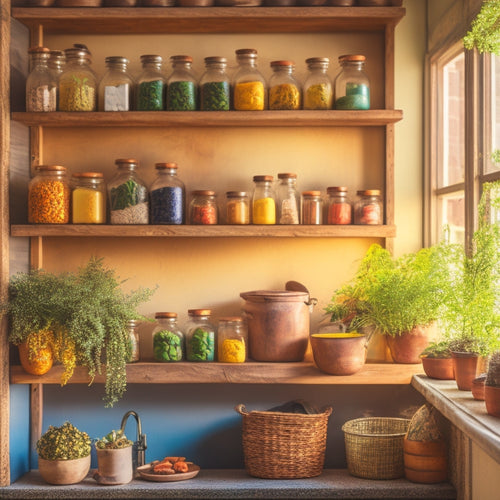
Explore Diverse Survival and Cooking Guides
Share
Diverse survival and cooking guides provide a thorough foundation for individuals seeking to develop essential skills in preparedness, outdoor culinary expertise, and wilderness survival. From natural disaster guidance to preserving food for sustainability, these resources empower individuals to respond effectively to emergencies and thrive in the wilderness. Outdoor cooking and smoking techniques enhance the wilderness experience, while specialty guides cater to niche interests in cooking, preserving, and survival. By exploring these varied guides, individuals can develop a robust skill set that prioritizes self-sufficiency and sustainability, and discover the expertise needed to overcome any outdoor challenge that comes their way.
Key Takeaways
• Discover comprehensive survival guides for natural disasters, emergency food storage, and wilderness survival skills to ensure readiness in crisis situations.
• Explore diverse food preservation methods, including canning, dehydrating, freezing, and fermenting, to reduce food waste and promote sustainability.
• Learn outdoor cooking and smoking techniques to prepare meals in the wilderness and preserve meat for longer shelf life and enhanced flavor.
• Develop essential wilderness survival skills, such as nature identification, primitive skills, and preparedness, to respond effectively to emergencies.
• Access specialty guides catering to niche interests in cooking, preserving, survival, and nature identification to expand knowledge and skills.
Survival Handbook Essentials
Essential guidance for natural disasters or emergencies is provided in the 'Emergency Food Storage & Survival Handbook', a thorough resource that helps individuals plan for disruptions in power, water, and food supply, ensuring readiness for extended emergency situations.
This all-encompassing guide covers vital aspects of emergency preparedness, including food storage, providing individuals with the necessary knowledge to safeguard their well-being. By mastering the strategies outlined in this handbook, individuals can confidently face uncertainty, knowing they have a reliable plan in place to navigate unexpected events.
With its practical advice and expert insights, the 'Emergency Food Storage & Survival Handbook' is an indispensable resource for anyone committed to emergency preparedness and self-sufficiency.
Preserving Food for Sustainability
By preserving food through various methods, individuals can not only guarantee a steady supply during emergencies but also contribute to a more sustainable lifestyle by reducing food waste and relying less on industrial agriculture.
To achieve this, consider the following food preservation techniques:
-
Canning: a popular method for preserving fruits, vegetables, and meats by sealing them in airtight containers.
-
Dehydrating: removing moisture from food to prevent spoilage, allowing for long-term storage.
-
Freezing: preserving food by storing it at extremely low temperatures, ideal for meats and vegetables.
- Fermenting: using microorganisms to break down food, creating nutritious and sustainable options like sauerkraut and kimchi.
Outdoor Cooking and Smoking
Mastering outdoor cooking and smoking techniques empowers individuals to prepare delicious and nutritious meals in the wilderness, using minimal equipment and maximizing the flavors of their catch.
Campfire cooking requires adaptability and creativity, as cooks must work with available resources and unpredictable weather conditions.
Meat preservation is an essential aspect of outdoor cooking, as it guarantees the safety and quality of harvested game and fish.
Smoking, in particular, is an effective method for preserving meat, allowing for a longer shelf life and enhanced flavor.
By mastering outdoor cooking and smoking techniques, outdoor enthusiasts can enjoy a more sustainable and self-sufficient wilderness experience.
With the right skills and knowledge, anyone can transform their outdoor adventures into culinary successes.
Wilderness Survival Skills
In the wilderness, possessing fundamental survival skills can mean the difference between life and death. It enables individuals to respond effectively to emergencies and adapt to unpredictable environments. Developing wilderness survival skills requires a deep understanding of nature identification, primitive skills, and emergency preparedness.
To excel in wilderness survival, focus on the following essential skills:
-
Nature Identification: Learn to identify edible plants, navigate using natural signs, and recognize potential hazards like venomous snakes and poisonous berries.
-
Shelter Building: Know how to construct a sturdy shelter using natural materials like leaves, branches, and rocks.
-
Fire Starting: Master various fire starting techniques, including using flint and steel, bow drill, and magnifying glass.
- Water Purification: Understand how to purify water using methods like boiling, solar disinfection, and sand filtration.
Specialty Guides for Enthusiasts
For enthusiasts seeking in-depth knowledge on specific topics, our specialty guides offer a wealth of information on subjects ranging from cooking and preserving to wilderness survival and nature identification. These guides cater to niche interests, providing expert advice on unique outdoor recipes, rare preservation methods, and niche foraging techniques.
| Guide | Topic | Features |
|---|---|---|
| Backpack Gourmet | Outdoor Cooking | Unique recipes for campers and backpackers |
| The Jerky Bible | Jerky Making | Expert techniques for making beef, turkey, and game jerky |
| Primitive Skills and Crafts | Wilderness Survival | In-depth guide to primitive skills and traditional crafts |
| Common Mushrooms of the Northwest | Nature Identification | Thorough guide to identifying mushrooms in the Pacific Northwest |
| Native American Medicinal Plants | Herbal Medicine | Insights into traditional medicinal plants and their uses |
These specialty guides are perfect for enthusiasts looking to expand their knowledge and skills in specific areas.
Frequently Asked Questions
What Is the Average Shipping Time for Domestic Orders?
While shipping delays can be frustrating, Paradise Cay Publications offers expedited shipping options to guarantee timely delivery. For domestic orders, standard shipping takes 3-7 business days, while expedited shipping guarantees delivery within 2-3 business days.
Can I Return a Book if It's Not What I Expected?
At Paradise Cay Publications, we prioritize customer satisfaction. If a book doesn't meet your expectations, our return policy allows for a hassle-free return within a reasonable timeframe, ensuring your complete satisfaction with your purchase.
Do You Offer Discounts for Bulk Orders or Wholesale Customers?
Did you know that 75% of businesses report increased customer satisfaction when offering bulk pricing? At Paradise Cay, we offer wholesale discounts to guarantee customer satisfaction, providing tailored bulk pricing solutions for our valued customers.
How Do I Track My Order Once It Has Been Shipped?
"To track your order, refer to your shipping confirmation email for tracking updates and Delivery ETA. For shipping inquiries, contact our customer support team at orders@paracay.com, and we'll be happy to assist you with any concerns."
Are Your Books Available in Digital or E-Book Formats?
Did you know that 72% of Americans have read an e-book in the past year? Currently, our books are only available in print format, but we're exploring e-book compatibility to enhance the digital reading experience for our customers.
Related Posts
-

Over-The-Door Kitchen Rack Installation Tips
To install an over-the-door kitchen rack effectively, start by measuring your door's clearance to guarantee a proper ...
-

Over-The-Door Kitchen Storage for Large Families
Over-the-door kitchen storage is a transformative solution for large families. It maximizes vertical space, keeping y...
-

Wall Racks for Storing Kitchen Herbs and Spices
Wall racks for storing kitchen herbs and spices are a revolutionary advancement for maximizing your kitchen space. Th...


